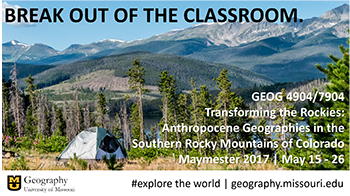#Exploretheworld this Summer @Mizzou!
New Maymester (May 15–26) Field Course
Professors
Dr. Grant Elliott, Dept of Geography
Dr. Soren Larsen, Dept of Geography
Description of Content
Increasing evidence supports the idea that we have entered into the geologic epoch known as the Anthropocene, where humans both directly and indirectly impact the processes and patterns responsible for shaping the Earth’s surface. Ongoing warmth will likely alter environmental factors that have been stable throughout the Holocene and as a result, creates a mosaic of change that reworks how geographers study interlinked human and physical processes regionally. This course uses the Southern Rocky Mountains region of Colorado to explore and interpret the physical and cultural landscapes of the Anthropocene geographies over the past 500 years. Students will learn field techniques in physical and cultural geography to reconstruct past landscapes, document landscape change over time, and apply this knowledge to the human and physical systems of contemporary global change ecology. Using historical photographs from the late 1800s, students will use repeat photography to synthesize links between physical and cultural geography, such as how land-use legacies impact the climatic sensitivity of a forested landscape, and the collision of exurbanization and natural hazards at the wildland urban interface. Professors Elliott and Larsen have extensive field experience in the region, including numerous professional research contacts with local experts who will lead field trips during stays in the San Juan Mountains of southwest Colorado and the Great Sand Dunes National Park. Other sites for regional comparison will be explored during shorter stays in Leadville, Telluride, and Durango.
Course Requirements
Students will be expected to read assigned books and articles on the region and topics covered in the course. Students will be assigned repeat photography sites and will be responsible for teaching the course material to their peers at this time. For the final project, students will prepare and deliver a presentation based on the repeat photography to show how landscape change illuminates the Anthropocene geographies of the region.
